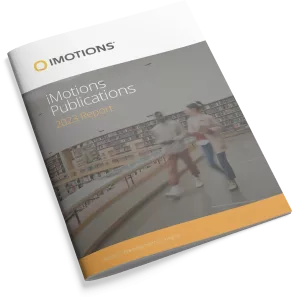-
Predicting video virality and viewer engagement: a biometric data and machine learning approach
Predicting video virality is the holy grail of marketing today. Previous video virality prediction research has relied upon two processes that may lead to incomplete data or incomplete analyses: non-subconscious data collection and self-reporting. This exploratory study evaluates the potential of using a physiological manifestation of emotions captured through facial expressions and skin conductance to […]
-
Self-reported eye contact sensitivity and face processing in chromosome 22q11.2 deletion syndrome
Introduction 22q11.2 deletion syndrome (22qDS) has been associated with varying levels of social impairments, and with atypical visual scanning of faces. The present study explored whether self-reported sensitivity to eye contact might be related to these phenomena. Method Individuals with confirmed 22qDS were interviewed about their experience and possible discomfort with eye contact. In cases […]
-
Prenatal affective cognitive training: A proof-of-concept study
Negatively biased cognitive response to infant stimuli during pregnancy is associated with increased postpartum depression (PPD) risk. This proof-of-concept study aimed to investigate the feasibility and effects of a two-week affective cognitive training intervention on cognitive responses to emotional infant stimuli for pregnant participants at risk of PPD. Forty-three participants were included: 23 at high risk and 22 at […]
-
Investigation and Prediction of Cognitive Load During Memory and Arithmetic Tasks
The research presented in this paper aimed to study the effects of arithmetic and memory tasks (with two levels of difficulty: easy and hard) on human cognitive load using biometric eye tracking techniques. The experiment was conducted with thirty-one participants using iMotions’ integrated biometric platform. In addition to the eye tracking technique, data was also […]
-
What Are You Gazing At? An Approach to Use Eye-Tracking for Robotic Process Automation
User Interface (UI) logs are crucial in capturing and analyzing user behavior, enabling a comprehensive understanding of business processes and eventual process automation with Robotic Process Automation (RPA). However, extracting meaningful insights from UI logs becomes challenging, especially when dealing with complex and information-dense graphical user interfaces. This paper presents a novel approach that leverages […]
-
Examination of gaze behaviour in social anxiety disorder using a virtual reality eye-tracking paradigm: protocol for a case–control study
Social anxiety disorder (SAD) has an early onset, a high lifetime prevalence, and may be a risk factor for developing other mental disorders. Gaze behaviour is considered an aberrant feature of SAD. Eye-tracking, a novel technology device, enables recording eye movements in real time, making it a direct and objective measure of gaze behaviour. Virtual […]
-
Effects of pictorial warning labels depicting lesser-known and well-known risks of smoking on viewing patterns, recall, and knowledge of smoking harms
In 2019, the Food and Drug Administration introduced 11 pictorial warning labels (PWLs) for inclusion on cigarette packages, created in compliance with court recommendations and tailored to increase knowledge of smoking harms. Several highlighted lesser-known risks of smoking. No behavioral studies have yet evaluated how risk content in PWLs impacts viewing patterns, recall, and knowledge […]
-
DUX: a dataset of user interactions and user emotions
User experience evaluation is becoming increasingly important, and so is emotion recognition. Recognizing users’ emotions based on their interactions alone would not be intrusive to users and can be implemented in many applications. This is still an area of active research and requires data containing both the user interactions and the corresponding emotions. Currently, there […]
-
Systematic Evaluation of Driver’s Behavior: A Multimodal Biometric Study
Abstract Complex traffic areas and high cognitive workload while driving are leading contributors to traffic crashes. Even though cognitive workload and stress have been previously assessed through various neurophysiological responses, they are rarely characterized simultaneously, limiting the triangulation of behavioral metrics (like drivers’ visual attention and facial coding) with physiological measures to investigate their interplay. […]
-
Using facial emotion recognition to research emotional phases in an inquiry-based science activity
Background Observational and declarative approaches applied by human observers have dominated the study of emotions, engagement, and attention. However, these approaches are susceptible to biases such as social desirability. Additionally, declarative approach cannot measure these parameters in real-time. Purpose This study aims to apply Facial Emotion Recognition (FER) technology in an inquiry-based activity to address […]
Research Report 2024
In-depth look at the scientific landscape as powered by iMotions software, showcasing groundbreaking research and the impact of our tools in various scientific and industrial fields.
iMotions Science Resources
Looking for white papers, validation reports or research show casing iMotions Multimodal capabilities?
Share Your Research

850+ universities worldwide with an iMotions human behavior lab
73 of the top 100 highest ranked universities
710+ published research papers using iMotions
iMotions is used for some of the most interesting human behavior research studies carried out by top researchers around the world. Contact us to have your publication featured here.
The authors of these publications have used iMotions as a software tool within their research.
“Software should be cited on the same basis as any other research product such as a paper or a book; that is, authors should cite the appropriate set of software products just as they cite the appropriate set of papers” (Katz et al., 2020).
We therefore encourage you to cite the use of iMotions where appropriate.
How to cite iMotions
APA
iMotions (10), iMotions A/S, Copenhagen, Denmark, (2024).
Note: adjust the version and year where relevant.
5 Most Popular Blogs
Learn How to Conduct Human Behavior Research with iMotions
Publications
Read publications made possible with iMotions
Blog
Get inspired and learn more from our expert content writers
Newsletter
A monthly close up of latest product and research news




